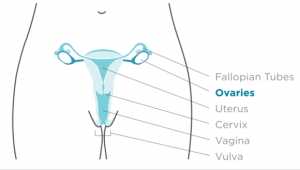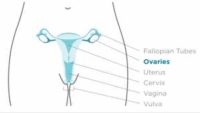
25 Sep Proteomics Leads to Discovery of Ovarian Cancer Protein Biomarker
MedicalResearch.com Interview with:
Fabian Coscia PhD
Department of Proteomics and Signal Transduction, Max Planck Institute of Biochemistry, Martinsried, German and
Ernst Lengyel MD PhD
Department of Obstetrics and Gynecology
Section of Gynecologic Oncology
University of Chicago, Chicago, IL
MedicalResearch.com: What is the background for this study?
Response: Ovarian cancer is a very aggressive disease. Only one in six patients survives more than 10 years after the first diagnosis. This high mortality is primarily because the disease is usually detected late in its course, when the tumor has already spread from the ovaries to the surrounding organs in the abdomen.
In an interdisciplinary collaboration between the Max Planck Institute of Biochemistry in Martinsried, Munich, the University of Chicago and the University of Copenhagen, we performed deep tissue proteomics on archived biobank material to identify drivers of long-term patient survival.
MedicalResearch.com: What are the main findings?
Response: We discovered that a protein, CT45, which was previously unknown, was significantly increased in long-term survivors. We then found that CT45 is likely to have a dual mode of action.
1) High CT45 expression in the tumor leads to increased platinum sensitivity, most probably through its interaction with the protein phosphatase 4 complex, and
2) CT45 is recognized and targeted by cytotoxic T-cells, enhancing their ability to kill tumor cells.
MedicalResearch.com: What should readers take away from your report?
Response: To our knowledge, this is the first example of mass spectrometry-based proteomics leading to the discovery of a prognostic and functionally important cancer biomarker. We believe that our ‘multi-level’ proteomics approach will be employed in future biomarker discoveries. The combination of unbiased and system-wide protein profiling with functional protein characterization integrates the important biological context into data analysis. With this approach, we can precisely identify those proteins most crucial to the disease.
MedicalResearch.com: What recommendations do you have for future research as a result of this work?
Response: Our findings, that CT45 contributes to platinum sensitivity and is a tumor-specific antigen recognized by cytotoxic T-cells, provide an excellent starting point for the development of more efficacious therapies. We have made great progress in understanding the function of CT45 and we are very hopeful that this knowledge will improve chemo and/or immunotherapies. In particular, we hope to develop anti-cancer immunotherapies targeting CT45 in the setting of acquired platinum resistance.
MedicalResearch.com: Is there anything else you would like to add?
Response: Our study highlights the importance of interdisciplinary and collaborative research tailored to important clinical questions. The ability to join applied state-of the art technology to relevant clinical questions, and then elucidate the mechanisms of action, will shape the future of bio-medical research. Archived biobank samples allow us to integrate detailed clinico-pathologic information into the study design and data analysis. Using these samples with clinical cancer proteomics will lead to future biomarker discoveries and, therefore, novel and effective treatments.
Citation:
Fabian Coscia, Ernst Lengyel, Jaikumar Duraiswamy, Bradley Ashcroft, Michal Bassani-Sternberg, Michael Wierer, Alyssa Johnson, Kristen Wroblewski, Anthony Montag, S. Diane Yamada, Blanca López-Méndez, Jakob Nilsson, Andreas Mund, Matthias Mann, Marion Curtis. Multi-level Proteomics Identifies CT45 as a Chemosensitivity Mediator and Immunotherapy Target in Ovarian Cancer. Cell, 2018; 175 (1): 159 DOI: 10.1016/j.cell.2018.08.065
[wysija_form id=”3″]
[last-modified]
The information on MedicalResearch.com is provided for educational purposes only, and is in no way intended to diagnose, cure, or treat any medical or other condition. Always seek the advice of your physician or other qualified health and ask your doctor any questions you may have regarding a medical condition. In addition to all other limitations and disclaimers in this agreement, service provider and its third party providers disclaim any liability or loss in connection with the content provided on this website.
Last Updated on September 25, 2018 by Marie Benz MD FAAD

